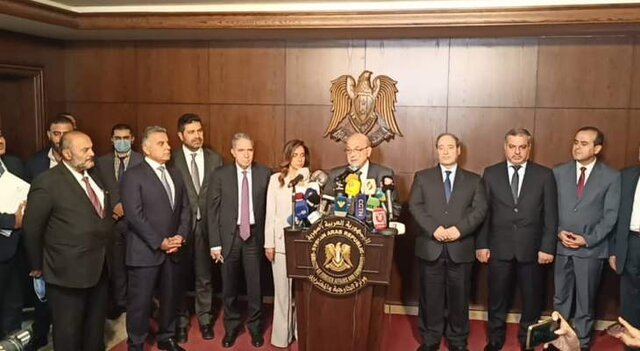Syria, Lebanon boost ties in blow to U.S.

TEHRAN - A delegation from Lebanon’s caretaker government arrived in Damascus in a bid to beef up bilateral relations between Syria and Lebanon, putting an end to a U.S.-led diplomatic blockade against Syria that has been in place since the outbreak of Syria’s civil war a decade ago.
The Lebanese delegation, led by caretaker Foreign Minister and Deputy Prime Minister Zeina Akar, arrived at the Jdeidet Yabous border crossing on the Syrian border on Saturday. Syrian Foreign Minister Faisal Mekdad received the Lebanese delegation upon arrival at the border crossing.
High-level officials Lebanese officials such as Finance Minister Ghazi Wazni, Energy Minister Raymond Ghajar, and General Security agency chief Major General Abbas Ibrahim accompanied Akar in her trip to Syria.
The Syrian state news agency, SANA, reported that the Lebanese delegation would discuss cooperation between the two countries, particularly the issue of importing Egyptian gas to Lebanon.
Head of the Lebanese-Syrian Higher Council, Nasri Khoury, confirmed in a statement to reporters that gas imports would be discussed.
Khoury pointed out that the visit aims to revive a previous agreement that allowed Lebanon to import gas from Egypt via Syria and Jordan.
At a meeting in Damascus, Akar and Mekdad discussed several issues. Immediately after the meeting, Khoury announced that Syria agreed to the Lebanese side's request for assistance in passing Egyptian gas and Jordanian electricity through Syrian territory, and confirmed its readiness to cooperate in that regard.
“We discussed the difficult situations the countries are going through, especially in the field of electricity and gas, and the Lebanese side requested the possibility of Syria's assistance to Lebanon in passing Egyptian gas and Jordanian electricity through Syrian territory. The Syrian side welcomed the request,” Khoury noted, adding, “The two sides agreed to follow up the detailed technical procedures through a joint technical team to discuss issues related to technical matters in both countries.”
The visit came at a time as Lebanon faces a dire fuel crisis that has crippled daily life. Due to fuel shortages, Lebanese are standing in long lines to receive a few liters of gasoline at gas stations.
Iran rushed to help the Lebanese to alleviate the fuel crisis. To this end, Iran sent a number of oil tankers carrying Iranian fuel to Lebanon. Hezbollah Secretary General Sayed Hassan Nasrallah confirmed this in a mid-August speech.
Nasrallah dropped a bombshell when he announced in mid-August that an oil tanker carrying Iranian fuel oil was bound for Lebanon. Addressing a commemorative ceremony marking the Day of Ashura on Thursday, Hezbollah’s chief announced that the first of several ships loaded with fuel oil would sail from Iran to Lebanon within hours, warning the United States and Israel against targeting it.
In late August, he said that due to the fuel shortage in Lebanon a deal was reached with Tehran to dispatch a third fuel-loaded tanker to the Mediterranean country.
Since late 2019 Lebanon has been mired in a deep financial crisis that has caused the Lebanese pound to lose around 90 percent of its value to the dollar. Severe fuel shortages and wide-scale power cuts have also paralyzed the country. Additionally, Lebanon is grappling with a political deadlock.
“We have agreed to start loading the third vessel. The coming days will prove those doubtful about the shipments arriving with fuel wrong … and our words will be clear when the first vessel reaches Lebanon,” Nasrallah said five days after he confirmed that the first tanker carrying Iranian fuel for Lebanon had already departed.
The Hezbollah chief said Lebanon’s current economic crisis was due to an economic siege imposed by the U.S., stressing that the so-called Caesar sanctions by Washington on Syria have also harmed Lebanon.
Facing growing cooperation between Iran and Lebanon, the United States stepped in to dissuade the Lebanese leaders from seeking help from Iran.
The announcement by Nasrallah sent the U.S. ambassador to Lebanon scrambling to find a way to prevent Lebanon from importing fuel from Iran. The ambassador, Dorothy Shea, rushed to speak with Lebanese President Michel Aoun hours after Nasrallah’s announcement.
President Aoun received a phone call from the U.S. Ambassador to Lebanon informing him of the U.S. administration’s decision to help Lebanon import electricity from Jordan and gas from Egypt.
But there was a problem: Egyptian gas and Jordanian electricity needed to pass through Syria. The U.S. made arrangements to address this problem. It gave the green light to Egypt and Jordan to do business with Syria in order to prevent Lebanon from relying on Iranian fuel.
But even this American ploy end up strengthening relations among Resistance Axis countries. Khoury said the visit by the Lebanese delegation “carries political indications” and other ones related to the issues of gas and activating cooperation between the two countries.
He added that “Syria has always been positive in all its approaches”, stressing Syria’s keenness to cooperate and extend aid to Lebanon despite all the difficulties facing it.
Leave a Comment